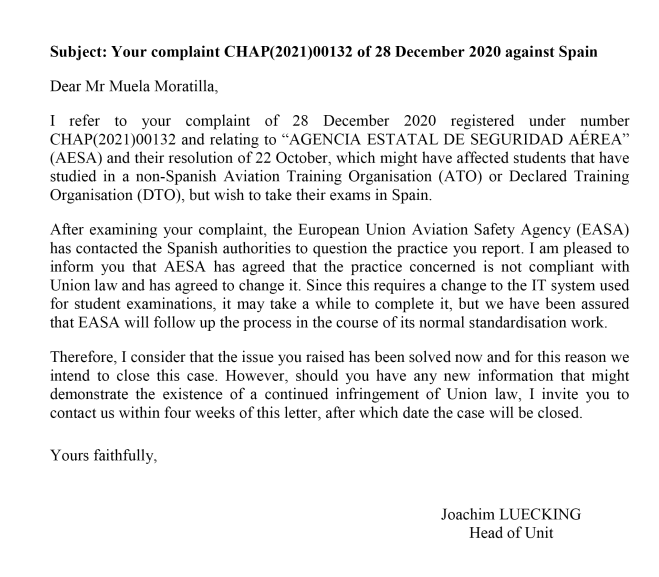Overview of the Complaint to Spanish Civil Aviation Authorities
In December 2020, a complaint was brought to the attention of the Spanish Civil Aviation authorities regarding the treatment of students from non-Spanish Aviation Training Organizations (ATO) or Declared Training Organizations (DTO) who sought to take their exams in Spain.

EASA’s Investigation into Spain’s Practices
Subsequently, the European Union Aviation Safety Agency (EASA) investigated the matter and, after thorough consideration, determined that the current practice was not in compliance with Union law and required attention.
Impact on International Flight School Students
The situation impacted students who had received their theoretical knowledge instruction from international flight schools and wished to pursue their written exam for the Pilot License in Spain. This presented a challenge for these determined aviators and potentially put their aspirations of becoming licensed pilots in jeopardy. Consequently, students had to navigate a complex regulatory system in search of a feasible solution.
EASA’s Response and Subsequent Discussions
In response to the complaint, the EASA engaged with the Spanish Civil Aviation authorities to express their concerns about the treatment of international students. After discussions, both parties agreed that the current practice was not in compliance with Union law and required rectification. A plan for a new process was set in motion, providing hope for aspiring pilots.
Breakthrough in the Examination System
The Spanish authorities agreed to revise the system, ensuring that all students, regardless of their origin of study, were treated fairly. This change was a significant step forward for those seeking to do their written exam in Spain. However, IT system adjustments may prolong the implementation process, resulting in uncertainty for affected students.
Awaiting Full Implementation of Proposed Changes
While there is optimism about resolving the issue, it remains unclear whether the proposed changes have been fully implemented. Nonetheless, the commitment from the EASA and the Spanish authorities to address the problem is encouraging, and it brings hope for a more inclusive and harmonious approach to aviation training.
The Power of Advocacy in the Aviation Industry
Despite the complexities and uncertainties, this experience highlights the importance of advocacy and cooperation within the aviation industry. Aspiring pilots should remain determined, knowing that their voices have been heard and the global aviation community is working towards greater accessibility and equity in aviation training.
The Role of Flying Schools and Alternative Exam Locations
As we await a definitive resolution, let us acknowledge the progress made so far and continue to support aspiring student pilots in their pursuit of aviation excellence. While the skies may present significant challenges, the passion and determination of these aviators will undoubtedly propel them towards their dreams. In the meantime, an increasing number of flying schools have chosen to offer their students the written exam with Austro Control in several locations around Spain. So the problem is largely bypassed.
- Mastering Air Law: Essential Knowledge for Your Private Pilot Licence
- A Guide to Theoretical Knowledge for the Private Pilot Licence
- EASA Private Pilot Licence (PPL): A Guide to Training Requirements and Costs
- How to Become a Professional Pilot in Europe: A Comprehensive Guide
- Pilot shortage in Europe: What you need to know